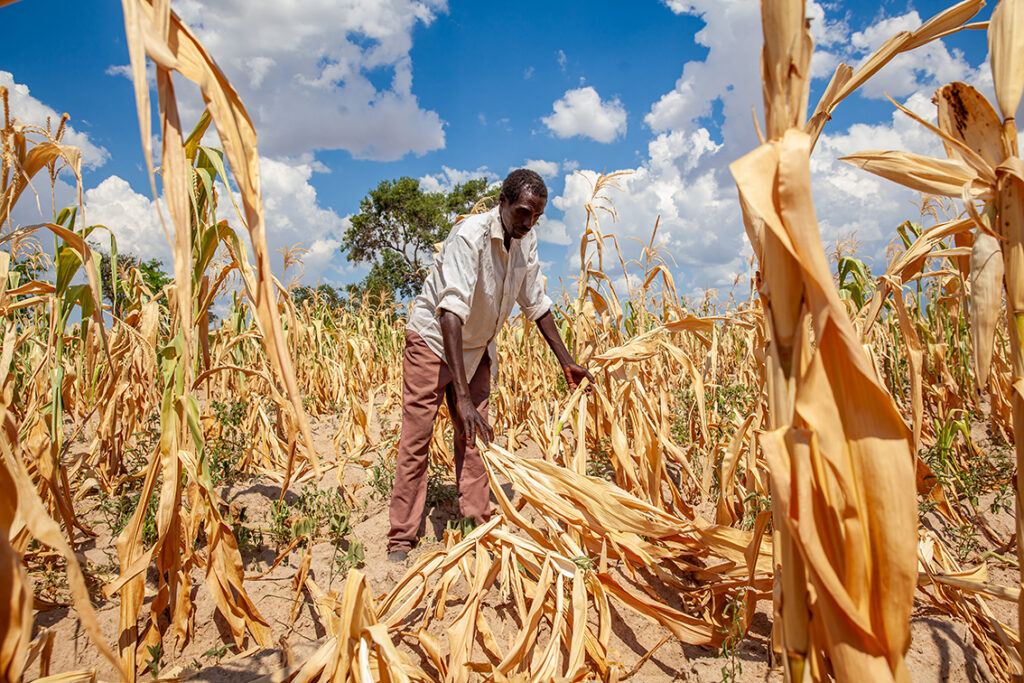- This funds will support an estimated 235,000 households in Malawi’s Lower Shire and Southern regions.
- The ongoing El Niño phenomenon in Malawi is one of the worst on record that has wreaked havoc on families.
- By September 2024, a total of $62M in disaster risk insurance payouts will go to countries affected by El Niño in Southern Africa.
In the face of a roiling climate crisis, drought-hit families in Malawi have received a lifeline in the form of a $11.2 million insurance payout. This critical support, facilitated by the African Risk Capacity (ARC) Group and the African Development Bank (AfDB), aims to help Malawi recover from the devastating effects of a severe drought brought on by the 2024 El Niño weather pattern.
The funds will help provide much-needed relief to hundreds of thousands of households across the Southern African country, highlighting the urgent need for proactive climate risk management strategies in Africa.
Early this month, President Dr. Lazarus Chakwera of Malawi received a cheque for $11.2 million from representatives of the ARC Group and AfDB. This payout is a direct response to the Malawian government’s drought insurance policy, financed through AfDB’s African Development Fund and the Africa Disaster Risk Financing (ADRiFi) Programme Multi-Donor Trust Fund.
The funds are earmarked to support food assistance for an estimated 235,000 households in Malawi’s Lower Shire and Southern regions and to provide cash transfers to roughly 118,000 households in the Central region.
President Chakwera lauded the insurance initiative, stating, “The insurance payout we receive today is not just a financial transaction; it is a lifeline for our vulnerable populations. It is a testament to the power of foresight and planning, allowing us to respond swiftly and effectively to the needs of our people.”
Climate crisis: The Impact of El Niño on Malawi
This year’s unravelling El Niño phenomenon in Malawi is one of the strongest on record and has wreaked havoc across Southern Africa. El Niño is usually characterized by the abnormal warming of the eastern Pacific Ocean, and it has led to severe dry conditions in Southern Africa, drastically reducing rainfall and exacerbating drought conditions.
According to the World Meteorological Organization, the 2024 El Niño has brought record-high temperatures and below-average rainfall, creating a crisis for regions dependent on agriculture.
Malawi has been particularly hard hit. The drought has intensified food shortages in the Lower Shire and Southern regions, where many communities rely on subsistence farming.
In March 2024, the Malawi declared a state of disaster in the worst-affected areas and subsequently launched a National El Niño Response Appeal in April, seeking resources to address the humanitarian crisis and boost food production.
The $11.2 million payout is a direct response to this dire situation, providing immediate relief to those most affected by the drought. The funds will help ensure that no Malawian endures the worst consequences of the dry spell, particularly hunger and malnutrition.
The Role of ARC and AfDB in climate risk management
The ARC Group and the AfDB have been instrumental in providing African governments with the tools and resources needed to manage climate risks effectively. Specifically, ARC mechanism enables timely interventions by pooling risk across the continent, thereby allowing member states to access funds quickly in the event of extreme weather events or natural disasters.
“The devastating El-Nino-driven southern African drought underscores the critical need for preparedness in the face of escalating weather-related disasters,” said Ibrahima Cheikh Diong, UN Assistant Secretary General and ARC Group Director General.
He acknowledged the vital role of partners such as the AfDB in making it possible for African governments to participate in ARC risk pools. The collaboration between these institutions has proven to be a lifeline for drought hit households in countries such as Malawi, enabling them to provide timely assistance to vulnerable populations.
Dr. Yero Baldeh, Director of the Transition States Coordination Office at AfDB, highlighted the connection between climate change and fragility, particularly in terms of food security and livelihoods. “The AfDB, through the Transition Support Facility (TSF), will support government efforts to strengthen capacities for prevention, preparedness, and resilience against climatic shocks in Malawi,” he noted.
Read also: Climate change crisis calls for women agro-empowerment
A broader impact across Southern Africa
Malawi is not alone in receiving support through the ARC and AfDB’s collaborative efforts. By September 2024, the ARC Group is expected to have disbursed a total of $62 million in disaster risk insurance payouts to countries affected by El Niño in Southern Africa.
These payouts include $11.6 million to Malawi, $5.5 million to Mozambique, $13.3 million to Zambia, and $31.8 million to Zimbabwe.
This widespread financial assistance demonstrates the effectiveness of ARC’s insurance mechanism in mitigating the impacts of climate-related disasters across the continent.
The ADRiFi Programme
The Africa Disaster Risk Financing (ADRiFi) Programme, a key player in facilitating these insurance payouts, has been at the forefront of providing capacity building and sovereign insurance premium support to 16 regional member countries of the AfDB.
Since its inception in 2014, ADRiFi has protected over 5 million people from severe droughts and tropical cyclones, with $150 million in claims disbursed to date.
The ADRiFi Multi-Donor Trust Fund, which finances these insurance policies, is supported by contributions from governments such as Canada, Switzerland, the United Kingdom, the US, and Norway.
As climate change continues to pose challenges to the African continent, initiatives such as ARC and ADRiFi are vital in providing the necessary support to those most vulnerable. By investing in risk management and preparedness, Malawi and other African nations can better withstand the impacts of climate change, ensuring that their populations are protected from the worst outcomes.
